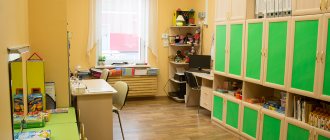One of the most important areas in the correctional and educational activities of a preschool teacher-speech therapist is working with parents as one of the conditions for optimizing the pedagogical process and socialization of a child with speech disorders. It is important to make parents active participants in the pedagogical process, to teach them to adequately evaluate and develop their child.
The survey allows us to identify the level of competence of parents in matters of children’s speech development, establish feedback, and analyze the effectiveness of the speech therapist teacher’s work with parents in the process of organizing correctional and developmental activities. In the future, this information helps in the construction and organization of the educational process.
Questionnaire for parents No. 1
Each of you wants to raise your children educated, well-mannered, and comprehensively developed. This task can only be accomplished in close cooperation between parents and teachers.
We ask you to answer the questions in the questionnaire. Please note that the survey questions already contain ready-made answers. Your task is to choose one of them.
1. Do you consider the help of a speech therapist necessary in the development of children?
• Yes. • No. • Difficult to answer.
2. Have you noticed any changes in your child’s development over the past school year?
• Yes. • No. • Difficult to answer.
3. If you noticed, what changes are these?
• Positive. • Negative. • I find it difficult to answer.
4. If you have had to take part in parent meetings, workshops, or consultations of preschool educational institutions, please select which of the statements below corresponds to your personal feeling after attending the meeting:
• It was a good conversation, although I already knew what they were talking about.
• The meeting involuntarily made me think about many things that I had not previously taken into account, and gave me an impetus to evaluate my own parental successes and failures in the development and upbringing of a child.
• I guess I wasted my time coming to the meeting.
• The speech therapist’s advice during the conversation turned out to be interesting. But it is quite difficult to follow them further, although I do not regret that I came to the meeting.
Questionnaire for parents No. 11 . Last name, initials (specify as desired)________________
2. How do you feel about your child attending speech therapy classes:
a) positive
b) negative, my child does not need special help
c) positive, but I’m embarrassed about it
d) another option (specify)__________________
3. Why do you think correcting children’s speech deficiencies:
a) because speech disorders interfere with the development of all mental processes and the child’s personality
b) because it's ugly
c) I think that there is no need to correct speech disorders, everything will go away on its own
d) another option____________________
4. Do you explain to your child why it is necessary to work on correct speech:
a) yes, otherwise he will not understand the meaning of speech therapy classes and will not try
b) I just force him to complete tasks, speak correctly
c) I don’t think it’s necessary to do this
d) another option (specify)__________
5. Do you think that the family should be directly involved in correcting speech disorders in the child:
a) yes, only by combining the efforts of a speech therapist, teacher and family can good results be achieved
b) yes, but we don’t have time for that
c) yes, but we don’t know what to do
d) no, this is the task of a speech therapist
e) another option (specify)___________
6. Which family members take part in the development of the child’s speech:
and all
b) no one
c) some (specify)_____________
7. How often do you complete the speech therapist’s tasks and recommendations:
a) always
b) when there is time
c) when there is a desire
d) when the child wants
e) another option (specify)__________
8. How often do you contact a speech therapist regarding the education, upbringing and development of your child’s speech:
a) constantly
b) only in extreme cases
c) very rarely, because I’m shy
d) I don’t need anyone’s advice, I know everything myself
e) another option (specify)____________
9. Answers to what questions regarding speech therapy work would you like to receive?:___________________
10. How do you evaluate the work of a speech therapist: ____________
11. Your comments and complaints about the work of the speech therapist:_________
12. Your suggestions, wishes for organizing speech therapy work: ___________________
Date of: ____________
Questionnaire for parents No. 2
Each of you wants to raise your children educated, well-mannered, and comprehensively developed. This task can only be accomplished in close cooperation between parents and teachers. We ask you to answer the questions in the questionnaire.
Please note that the survey questions already contain ready-made answers. Your task is to choose one of them.
1. Do you consider the help of a speech therapist necessary in the development of children?
• Yes. • No. • Difficult to answer.
2. Have you noticed any changes in your child’s development over the past year?
• Yes. • No. • Difficult to answer.
3. If you noticed, what changes are these?
• Positive. • Negative. • I find it difficult to answer.
4. If you have had to take part in parent meetings, workshops, consultations, please select which of the statements below corresponds to your personal feeling after attending the meeting:
• It was a good conversation, although I already knew what they were talking about.
• The meeting involuntarily made me think about many things that I had not previously taken into account, and received an impetus to evaluate my own parental successes and failures in the development and upbringing of a child.
• Perhaps I wasted my time by coming to the meeting.
• The speech therapist’s advice during the conversation turned out to be interesting. But it’s quite difficult to follow them further, although I don’t regret coming to the meeting.
FULL NAME. (parent)___________________________
Date of: __________________________
Questionnaire for parents No. 3
The effectiveness of correctional work as a continuous pedagogical process is largely determined by the quality and level of relationship and continuity of all its participants. The continuity of pedagogical influence in the system of work on speech disorders assumes a close relationship between the speech therapist and parents. Please fill out the form. The answers will help you evaluate the effectiveness of your work with children at home.
- Do you systematically organize activities with your child at home?
Answer: __________________
- How long does it take to teach a child at home?
Answer: ______________________
- How do you help your child?
Answer: __________________________
- How do you carry out the current correction?
Answer: ____________________________
- How do you reinforce your child's achievements?
Answer: __________________________
FULL NAME. (parent)______
Date of: ___________
Questionnaire for parents No. 4
Many years of experience of practical workers in the correction of speech disorders confirms the position that only in close contact between the speech therapist and the subjects of the educational process is the effectiveness of correctional work ensured. We ask you to take part in the survey. Please answer the questions.
- Your wishes to the speech therapist _________________
- Critical comments on organizing activities with your child._________________________
- What questions regarding speech therapy work would you like to receive answers to? Please write the scope of the questions.__________
- Do you need methodological help from a speech therapist? If yes, what help?_________________________
- Do you have the opportunity and desire to attend individual lessons with your child, parent meetings, individual consultations?
FULL NAME. (parent)____________
Date of: ____________
Questionnaire for parents No. 5
We ask you to evaluate the performance of the speech therapist over the past year. Please fill out the form.
- Are there any dynamics in your child’s speech development?
- How do you assess your child’s speech at this stage of correction?
- Did the results of the speech therapist’s correctional work coincide with the results you expected?
- Are you satisfied with the work of the speech therapist?
- Did you take part in the correction process?
FULL NAME. ____________
Date of: _________
Questionnaire for parents No. 2
The effectiveness of correctional work as a continuous pedagogical process in a speech therapy group is largely determined by the quality and level of relationship and continuity of all its participants. The continuity of pedagogical influence in the system of work on general speech underdevelopment presupposes a close relationship between the speech therapist and parents.
Please fill out the form. The answers will help you evaluate the effectiveness of your work with children at home .
1. Do you systematically organize activities with your child at home?
2. What is the duration of classes with a child at home?
3. Do you study the assignment before class?
4. How do you help your child?
5. How do you carry out the current correction?
6. How do you reinforce your child’s achievements?
Test results:
We count % which answers are more: A, A-B, B-C, C-D, D.
A:
“Ideal students”, the result will not be long in coming! Do not overload your child with clubs and sections; school is ahead.
A-B:
"Patience and a little effort"! Maybe not everything is working out yet, but you are on the right track! Remember that for results you need to practice systematically. Do not hesitate to contact your speech therapist with questions, come for consultations. It is important not to force the child to study, but to interest him, “motivate” him (show that you need it and it’s interesting, play with the child, arrange a competition). Remember that a preschooler needs to change types of activities more often.
B-C:
“Lack of time is not an excuse!” Especially with such a wonderful child like yours! Only through the joint efforts of parents and a speech therapist can the child be helped. If your child is often sick, sign up for additional consultations and get an assignment from a speech therapist for the duration of the home regime. If it is difficult to repeat tasks at home, you need to find out the reason; perhaps you need the help of a psychologist or consultation with a doctor.
V-G:
"There are no miracles." Even if we assume that the child is smart and the speech therapist is a wizard, you still may not have time to complete the speech correction program. Remember that without your help and participation, the child will not be able to overcome a speech defect. You need to make every effort - there is little time left! You may need to continue logo classes at school to avoid problems with your Russian language performance.
G:
Maybe you shouldn’t take up space at the logo station? Other children are waiting their turn!
Belyaeva E.N., teacher-speech therapist
Questionnaire for parents No. 3
Many years of experience of practical workers in the correction of speech disorders in preschool educational institutions confirms the position that only in close contact between a speech therapist and the subjects of the educational process is the effectiveness of correctional work . We ask you to take part in the survey. Please answer the questions.
1. Your wishes to the group speech therapist.
2. Critical comments on the organization of classes with your child.
3. What topics do you think need to be addressed in group consultations? Please write down the scope of the questions.
4. Do you need methodological help from a speech therapist? If yes, what help?
5. Do you have the opportunity and desire to attend individual lessons with your child, parent meetings, individual and group consultations, workshops?
Questionnaire test for parents of a child attending a speech therapy center in a kindergarten
At a preschool speech center, the parent is a full participant in the educational process. The test will show how interested you are in the result of this process.
Answer the test questions yourself and calculate the result - how many answers A___ B___ C___ D ___.
1.
Do you pay attention to your child’s speech and correct speech errors?
a) yes, the whole family is worried about this. b) we try, but we don’t have enough time. c) sometimes, depending on the situation. d) I think this is not necessary.
2.
How many sounds does your child not know how to pronounce?
a) 1-2. b) 3-6. c) a lot. d) I don’t know, they didn’t count.
3.
Do you remember when and what your child’s first words appeared?
a) of course, we even recorded it. b) I remember when I spoke. c) spoke late, I don’t remember exactly. d) I don’t remember - so much time has passed!
4.
Do you always carry out the speech therapist’s tasks with your child?
a) yes. b) we try. c) honestly - no. d) what tasks?
5.
How many times a week can you work out at home?
a) every day. b) 2 - 3 times a week. c) on a day off. d) we remember about the task in the morning, on the way to the garden.
6.
How often does a child miss or not attend kindergarten?
a) 1-2 times a month. b) one week a month. c) often gets sick: sometimes for a month at a time, or we go home. d) we go irregularly for various reasons.
7.
Do you use a notebook (folder) for homework?
a) yes, it’s like a diary! b) yes, although we don’t understand everything; c) yes, although we often forget it at home. d) no - we lost it, the child will remember it anyway.
8.
What difficulties do you experience when doing homework?
a) the child is distracted, it is difficult to sit him down and get him to study. b) we don’t understand everything about the speech therapist’s tasks. c) there is not enough energy and time to complete assignments d) why give assignments, this is not school!
9.
Do you need a consultation with a speech therapist to work with your child?
a) yes, definitely. b) yes, preferably. c) according to the situation. d) not required.
10.
You come for a consultation with a speech therapist when:
a) when we don’t understand something. b) when the speech therapist invites you. c) when the teacher and speech therapist demands/reminds. d) when there is time, but there is always not enough time.
11.
Is the number of classes at the speech center sufficient for your child?
a) yes, quite. b) no, we do extra work. c) no, what should I do? d) I don’t know.
12.
Does your child experience difficulties in the pre-school stages (reading, writing, perseverance)?
a) no, everything works out. b) sometimes he is not attentive or careful. c) reading and writing are difficult. d) there was no training before, and nothing - they studied normally.





